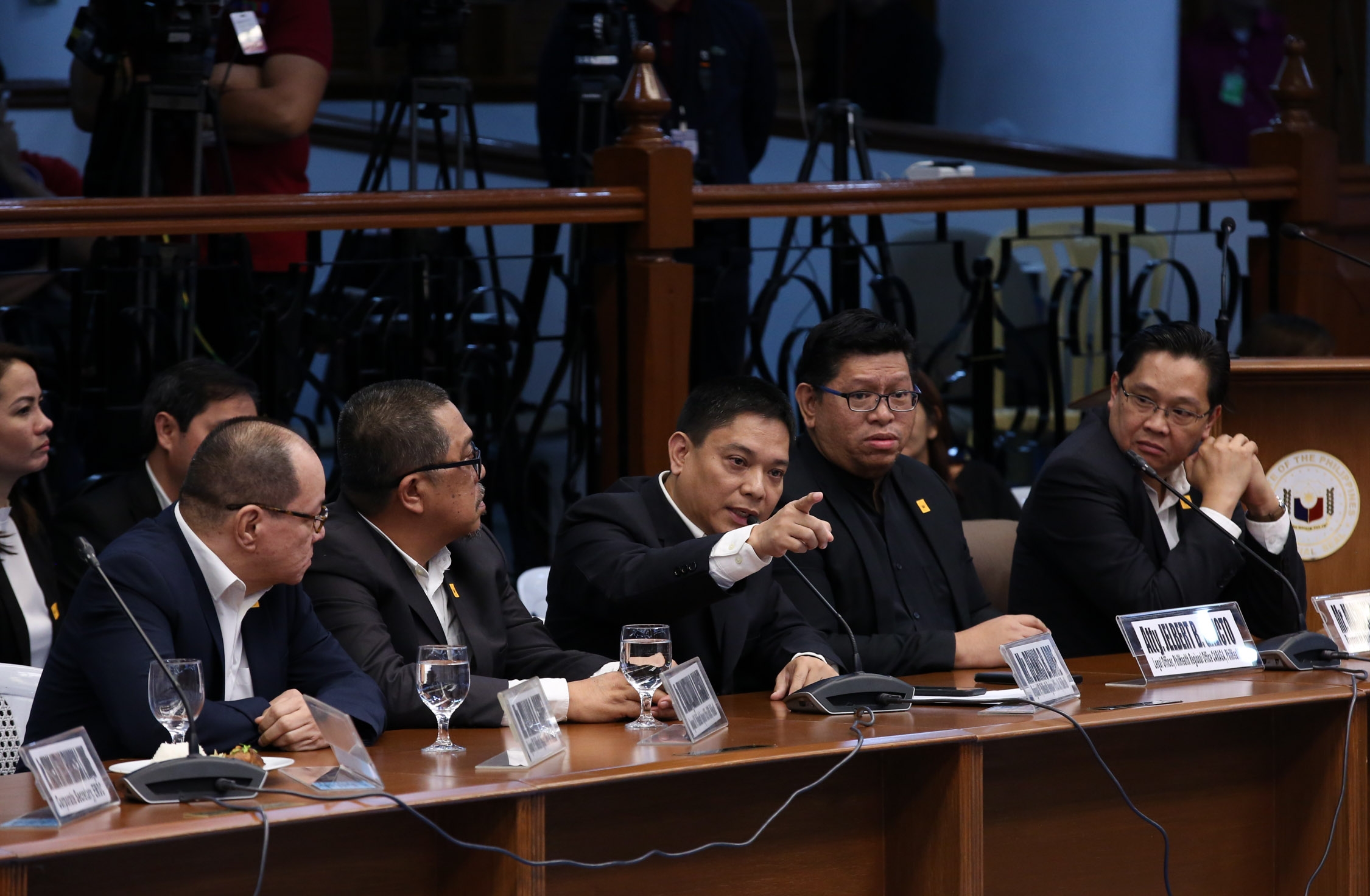‘Mafia’ aiding PhilHealth fraud named in Senate probe

Credit to Author: clopez| Date: Wed, 14 Aug 2019 21:30:02 +0000
A “mafia” led by the “Mindanao group” of eight senior officials of Philippine Health Insurance Corp. (PhilHealth) aided hospitals in defrauding the state insurance firm of billions of pesos, two former PhilHealth executives told the Senate on Wednesday.
The alleged members of the group did not hide their identities as they faced their accusers at the public hearing jointly presided over by Senators Richard Gordon and Bong Go.
Dr. Roy Ferrer, former PhilHealth president and CEO, said the mafia had orchestrated the ouster of his predecessors and even former Health Secretary Paulyn Ubial, who was forced to vacate her post after the Commission on Appointments rejected her appointment in October 2017.
Threats
Ferrer claimed that the group was behind the fraud schemes that deflated the state agency’s finances over the past several years.
He said he himself had been threatened that he would suffer the fate that befell the three former PhilHealth chiefs appointed by President Duterte.
“Actually, they are being protected. This mafia, I think, is organized,” Ferrer said in reply to questions from Senate Minority Leader Franklin Drilon.
Ferrer quit after the President asked top PhilHealth officials to submit their courtesy resignations following an Inquirer series on irregularities in the agency in June.
Asked by Drilon if he was willing to identify the mafiosi, Ferrer said naming them in public might incriminate him.
He said he had also informed his successor, Ricardo Morales, a retired Army general tasked by the President last month with cleaning up the state health insurance firm, about the group.
“I think we owe it to the public to tell (them) their names,” Drilon told Ferrer.
Resisted rotation
After some prodding from the senator, Morales said he was made aware that there was such a thing as the Mindanao group.
“There were three regional vice presidents who were resisting rotation. They comprise the Mindanao group. But I don’t know their names,” he said.
Ferrer turned to Dr. Roberto Salvador Jr., who also resigned as PhilHealth board member in June, to back up his allegation about the mafia and to identify its members.
Legislative immunity
Salvador said one member was actually from the Visayas and at least three others were from Luzon.
Sensing that Salvador was also stalling in identifying the alleged mafia members, Drilon and Sen. Panfilo Lacson requested Gordon to provide legislative immunity to Ferrer and Salvador to protect them from legal liabilities in connection with their testimony.
“I might get shot once I step out [of the Senate],” Salvador said.
He said the mafia had “a controllable influence” in PhilHealth, but it did not mean that its members were involved in extortion and other criminal activities.
Bragging
‘Mafia’ aiding PhilHealth fraud named in Senate probe
The group’s existence was “open knowledge” in PhilHealth, he said, adding that its members had been “always bragging” that they were behind the removal of senior officials in PhilHealth and the Department of Health.
“But what made you think they are the mafia?” Lacson asked Salvador.
He replied: “They have influence on government officials … They won’t follow even a simple order of rotation.”
After the senator assured him of protection, Salvador opened an envelope containing confidential reports on the supposed members of the PhilHealth mafia, most of whom had been occupying their posts for decades.
‘Mafia’ aiding PhilHealth fraud named in Senate probe
He named them as Khaliquzzaman Macabato, regional vice president (RVP) in the Autonomous Region in Muslim Mindanao; lawyer Valerie Anne H. Hollero, assistant corporate secretary; Datu Masiding Alonto Jr., RVP for Northern Mindanao; William Chavez, RVP for Central Visayas; and Paolo Johann Perez, RVP for Mimaropa.
Also identified as belonging to the group were Dennis Adre, RVP for Davao; lawyer Jelbert Galicto, RVP for Caraga; and Dr. Miriam Grace Pamonag, RVP for Central Mindanao.
During their time, Salvador said these officials initiated the filing of administrative complaints against PhilHealth officials, some of whom had been dismissed from service or suspended.
“As regional vice presidents, they are aware of the payments they had authorized. They should have raised red flags on the hospitals that had been committing fraud,” Salvador said.
“What they do is to destroy the current PhilHealth administration,” he added.
‘Picking on us’
Lacson then notified Gordon that the people Salvador had named were actually in the Senate session hall where the inquiry was being held.
Responding to the allegations against them, Hollero said she and the other officials were tagged as members of the mafia after they testified in a hearing in the House of Representatives on the massive fraud in PhilHealth during Ferrer’s tenure.
“Maybe that’s the reason why they are picking on us. They had been filing absurd administrative cases against us,” she told Gordon.
“We are standing for the truth. If we are gonna be called a mafia for it, then so be it,” Hollero said.
Chavez also denied the allegations against him, saying the “ludicrous administrative” complaints against him were just intended to harass him.
“All of us here have been consistently articulating against the flawed policies of this company,” he said.
“I’m just an ordinary person. I don’t have any personal connection with any senator. To say that I have influence, I think, is the height of dishonesty,” Chavez said.
Dead patients
Gordon said the systemic problem in PhilHealth was evident in the brief stints of three of its past presidents—Hildegardes Dineros, Celestine Ma. Jude dela Serna and Ferrer.
Lacson, meanwhile, claimed that besides “ghost” patients and overpayments, PhilHealth had spent for the medical fees of dead patients who were still admitted to hospitals after their reported deaths.
He said PhilHealth shouldered P20.3 million in hospital expenses of 961 dead patients as reported by the Commission on Audit.
“They were already dead, but [the hospitals] still collected payments,” said Lacson.